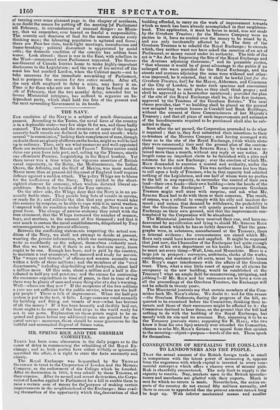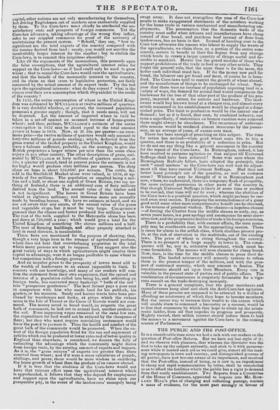CONSEQUENCES OF REPEALING THE CORN-LAWS TO LANDOWNERS AND THE PEOPLE.
THAT the actual amount of the British foreign trade is small in comparison with the latent power of increasing it, appears from the eagerness with which capital is invested in every commercial enterprise which offers a chance even of minute gain. Risk is cheerfully encountered. The only limit to supply is the capacity to receive. Nay, markets open to the British manufacturers and merchants are glutted with their exports. Much is sent for which no return is made. Nevertheless, the entire exports of the country do not exceed fifty tnillions annually, and there is reason to apprehend that the present amount cannot long be kept up. With inferior mechanical means and smaller
capital, other nations are not only manufacturing for themselves, but driving Englishmen out of markets once exclusively supplied by them. To the Corn-laws must chiefly be attributed the unsatisfactory state and prospects of foieign commerce. Yet the Corn-law advocates, taking advantage of the wrong they inflict, refer to our crippled commerce for proof of the necessity of maintaining the present system. "Behold.' they say, "how insignificant are the total exports of the country compared with the income derived from land : surely, you would not sacrifice the incalculably larger interest for the smaller : but to abolish the Corn-laws, is to commit this iniquitous absurdity."
Like all the arguments of the monopolists, this proceeds upon the false assumptions, that the agricultural interest relies for support on the Corn-laws—as if land could only be used to grow wheat ; that to repeal the Corn-laws would ruin the agriculturists; and that the benefit of the mercantile interest to the country, and its claim on that score to legislative protection, are fairly measured by the actual amount of its export trade. Try the test upon the agricultural interests: what do they export? what is the excess over their own consumption which they exhibit to the credit of the country ? In 1632, the entire consumption of wheat in the United Kingdom was estimated by M'Cuttocis at twelve millions of quarters. It is very doubtful whether, at present, the increased population possesses a greater supply ; though, that it needs more, will not be disputed. Let the amount of imported wheat in 1832 be taken as a set-off against an assumed increase of home-grown wheat ; and then, perhaps, M'Cum.ocx's estimate of the entire consumption in 1832 may be about equal to the total amount grown at home in 1838. Now, at 3/. 108. per quarter—an enormous price—the twelve millions of quarters would only amount to forty-two millions of pounds sterling ; which, deducted from the gross rental of the landed property in the United Kingdom, would leave a balance sufficient, probably, on the average, to give the British proprietors a larger return per acre than the same class enjoys in any other country. The other descriptions of grain, estimated by M'Cut.Locx at forty millions of quarters annually, at 30s. a quarter all round, (and at present prices the estimate is not too high,) would produce sixty millions per annum. The duty alone on hops is about 150,000/. per annum. The cattle, &c. sold in the Smithfield Market alone were valued, in 1830, at upwards of five millions. The population so supplied being a million and a half, or about one eighth of Great Britain, (we say nothing of Ireland,) there is an additional sum of forty millions derived from the land. The annual value of the timber sold is not insignificant. The horses in Great Britain have been valued at eighteen millions; and immense sums are annually made by breeding horses. We have no estimate at hand, and we are not aware that any exists, of the annual value of the grass and vegetable crops, but it must be very large. COLQUHOUN guessed that the cheese and butter produced five millions a year. The cost of the milk supplied to the Metropolis alone has been put down at 720,000/. a year ; which would give a total for the United Kingdom of something like eleven millions and a half. The rent of farming buildings, and other property attached to land in rural districts, is incalculable.
These facts are mentioned for the purpose of showing, that, though a very large item in the amount of agricultural produce, wheat does not bear that overwhelming proportion to the total which many persons are apt to suppose. They suggest also the great variety of ways in which agriculturists might employ their capital to advantage, were it no longer profitable to raise wheat in fair competition with a foreign grower.
And an impulse given to the prosperity of towns must add to the wealth of landowners to an extent impossible to limit. It
consists with our knowledge, and many of our readers will con firm the statement from their own experience, that the spread and increase of a population called into being by, and subsisting on foreign trade, has converted many bankrupt " lords of the soil" into "prosperous gentlemen." The best farmer pays a poor rent in comparison with him who needs land for his paddock, his garden, or his mansion. Sandy and barren tracts have been pur chased for warehouses and docks, at prices which the richest acres in the isle of Thanet or the Carse of Gowrie would not com mand. The money saved in bread would, as respects the great bulk of consumers, be laid out in animal food, another produce of the soil. Even supposing wages remained at the same low rate, the expenditure for food would not be reduced by the cheapness of flour; but they who must require nourishing sustenance would have the power to prccure it. Thus the health and comfort of the great bulk of the community would be promoted. When the ex tent of the foreign population fitted for the use and enjoyment of articles which can be produced at lower rates and of better quality in England than elsewhere, is considered, we discern the folly of estimating the advantage which the community might derive from foreign trade, by the existing amount of exports and imports. As it is, the "gross returns" of' exports are greater than those received from wheat; and if it were a mere calculation of pounds, shillings, and pence, there would be more wisdom in sacrificing the home growth of wheat than the produce of co nmerce abroad. If it is true that the abolition of the Corn-laws would not have that ruinous effect upon the agricultural interest which is apprehended, it follows that they who depend for employment and support upon the agriculturists, have no claim upon our prospective pity, in the event of' the landowners' monopoly being
swept away. It does not strengthen the case of the Corn-law people to make exaggerated statements of the cambers working for the home trade in various mechanical and manufacturing employments. The presumption that the domestic trade of the country must suffer when artisans and manufacturers have cheap instead of dear bread, and purchase beef' instead of flour from landowners, has no basis in fact. Instead of handing over to the Corn-law advocates the masses who labour to supply the wants of the agriculturists, we claim them as a portion of the entire coramunity, certain to benefit in their fair degree from any change which tends to create a larger quantity of things useful and desirable to mankind. Herein lies the grand mistake of those who support prohibitions of the trade in food or any other article. They forget the general rule, that the more there is for the mass, the better each individual must fare. If for the maney now paid for bread, the labourer can get bread and meat, of course he is benefited. The Corn-laws tend to restrict the growth of wheat abroad, and the manufacture of things to be exchanged for wheat. Suppose that there were no increase of population requiring land in a variety of ways, the demand for animal food would compensate the landowner for the loss of that other part of the produce of his property, imported in return for cottons and hardware. The landowner would buy his own bread at a cheaper rate, and almost every article consumed in his establishment would be charged at a diminished price. The limit to production would be the natural one of demand ; but as it is found, that men, by combined industry, can raise a superfluity, if restrictions on human exertion were removed there might always be abundance. The recurrence of unfavourable seasons would be rendered almost innocuous by the possession, on an average of years, of excess over want.
There has been enough of preaching on this subject. The time for action has arrived—when good wheat costs 80s. to 85s. a quarter, and there is no probability of a reduction in price. But we do not see any thing like a general movement in the country for the repeal of the Corn-laws. In Birmingham, indeed, it has been resolved to postpone agitation on that subject till Universal Suffrage shall have been achieved ! Some wise men whom the
Birmingham Radicals follow, have adopted the principle, that such " small matters" as the Corn-laws can well wait for adjust ment till they have carried Universal Suffrage. Had they not better leave principle out of the question, as well as common sense ? Whatever may be thought of it in Birmingham just
now, where, we understand, there is a temporary flush of' prosperity, the more rational persuasion in other parts of the country is, that though Universal Suffrage is likely at some time or another
to be carried, that time will not be soon ; whereas the abolition of
the Corn-laws is a practical question, which might perhaps be carried even next session. To postpone the accomplishment of a great good until some other more comprehensive bonefit can be obtained, is the reverse of practical wisdom. The chance—a hopeless chance —of forcing the Charter from the middle classes so early, say, as seven years hence, is a poor apology and recompense for semi-starv
ation now, and the progressive decl i ne of trade with foreign countries. There is a probability that, with earnest efforts, the corn monopoly may be overthrown even in the approaching session. There
is cause for alarm to the selfish class, which clutches present pro fit, at the risk of starvation to the multitude, out of the existing laws. The price of wheat is rising throughout the country. There is no prospect of a large supply to lower it. The conse quence will be, nay is, extensive discontent, which must become formidable. Time masses will soon clamour for cheap bread. Now, then, is the time for the middle classes to press their de mands. The landed aristocracy will scarcely venture to refuse them in the present temper of the millions, and with the pros
pect of continued scarcity, which may amount to famine. The constituencies should act upon their Members. Every vote is valuable in the present state of parties and of public affairs. The combination of circumstances is singularly favourable for a vigorous assault on the trade-destroying monopoly. There is a general complaint, that the great merchants and manufacturers hang aloof and shirk the Anti-Corn-law agitation. Many of these persons are supposed to be actuated by a dislike of offending an aristocracy of which they hope to become members. But the surest way to increase their wealth to the extent which will enable them to command a baronetcy or a coronet, would be
to free that commerce by which they hope to climb up the aristocratic ladder, from all that impedes its progress and prosperity. Rightly viewed, their selfish interest should induce them to lead the masses in a movement against the Corn-laws in the coming session of Parliament.



























 Previous page
Previous page